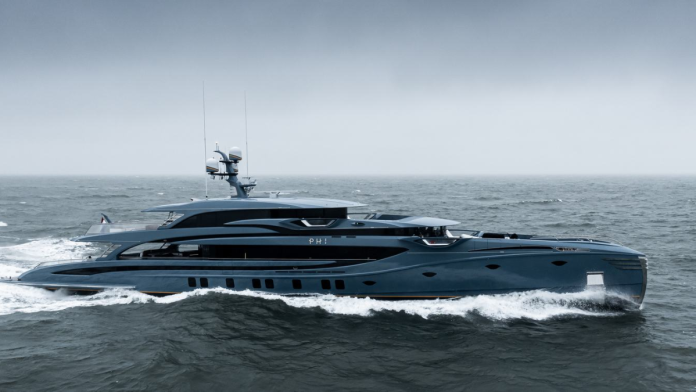A massive 190-foot superyacht named Phi, owned by Russian businessman Sergei Naumenko, has been sitting idle in a London harbor for more than three years. The luxury vessel, worth hundreds of millions, cannot leave port after the U.K. government ordered it detained in 2022.
The decision was linked to sanctions tied to the Russia-Ukraine war. Authorities argued that even though Naumenko is not officially banned from owning the vessel, he should not be allowed to enjoy it. This unusual move marked the first time such a detention happened in British waters.
Since then, Phi has remained in limbo. Legal battles stretched all the way to the U.K. Supreme Court, where judges recently ruled that the detention is lawful. The ruling means the vessel must stay where it is, despite repeated appeals.
The superyacht is considered a floating palace, complete with luxury interiors and top-class amenities. Before sanctions, it could be rented for more than €650,000 ($761,000) per week, making it a symbol of extreme wealth and privilege.
Court Ruling and the Power of Sanctions
In the latest court case, Naumenko’s legal team argued that Phi was being unfairly held without a valid reason. They said there was no direct proof that its use or ownership broke any laws.
Dutch foreign minister Caspar Veldkamp resigns after cabinet rejects tougher Israel sanctions
But the Supreme Court disagreed. Judges said that detaining the superyacht was legal because its existence and use still bring prestige, money, and benefits to those connected to Russia’s political and economic circles. The U.K. government had cited Naumenko’s ties to Russian President Vladimir Putin when ordering the detention.
Sanctions, in simple terms, are government restrictions designed to block financial activities and influence. Instead of seizing property outright, authorities often freeze its use so it cannot generate income or status. In this case, Naumenko still legally owns Phi, but he cannot sail it, rent it out, or enjoy it.
The Supreme Court’s ruling is also significant because it sets a precedent. It is the first time in British waters that a luxury yacht has been held so long under sanctions. By siding with the government, the judges confirmed that prestige items can be restricted if they indirectly support political or economic networks.
The case highlights how sanctions can reach into personal lifestyles. Superyachts, often described as toys of the ultra-rich, are now becoming tools in international disputes. The detention of Phi shows how luxury assets are no longer untouchable when tied to global conflicts.
The Hidden Environmental Cost of Superyachts
Beyond politics and sanctions, the story also points to another issue: the environmental cost of these enormous vessels. Superyachts consume huge amounts of fuel every day. Experts say a single superyacht can release more carbon emissions in one year than 1,500 cars combined.
🛑 UK blows lid on Russia’s $9.3B crypto sanctions dodge through Kyrgyzstan financial network
For many environmental advocates, this case shines a light on how luxury lifestyles impact the planet. While ordinary people are asked to recycle, drive less, or cut energy use, superyachts remain among the most polluting forms of leisure.
Even though cleaner marine technologies like electric ferries and wind-assisted ships already exist, most private superyacht still run on traditional fuel. Critics argue that such displays of wealth are the least sustainable way to use resources.
The detention of Phi is not unique. Since 2022, several yachts linked to wealthy Russian figures have been seized or blocked in harbors across Europe and beyond. From Italy to Spain and even as far as Fiji, governments have used the same tactic to put pressure on elites. These seizures have drawn attention because they target highly visible symbols of billionaire wealth and power.
Online discussions have reflected both political and environmental frustrations. On social platforms, one commenter summed it up with the phrase: “The sweet smell of sanctions.”
The detained Phi has now become more than a legal case. It is a symbol of how wealth, power, and global politics intersect, and how luxury assets can be caught in the middle of international struggles.


